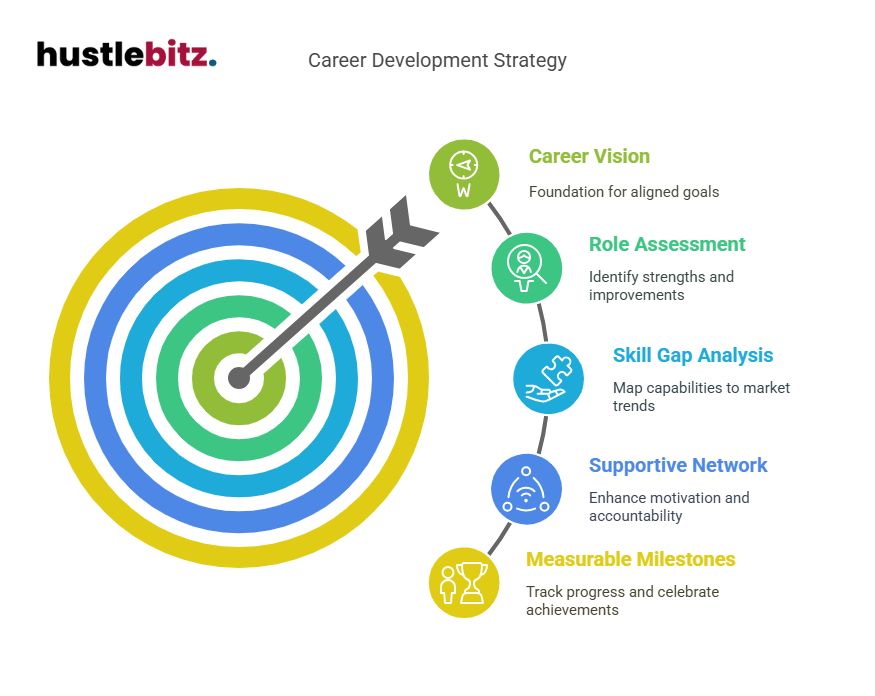To achieve purposeful career milestones, consider five effective strategies. First, master career path mapping to create a clear vision and monitor progress. Next, assess your current role to identify strengths and areas for development. Conduct a skill gap analysis to align your capabilities with market trends. Establish an innovative accountability system, utilizing peer mentorship for support and motivation. Lastly, foster a growth mindset by building a strong professional network that encourages resilience and continuous learning. Each of these strategies can significantly enhance your career trajectory, and further insights can enrich your understanding of these critical concepts.
Key Takeaways
- Establish a clear career vision to align goals and enable focused progress tracking throughout your professional journey.
- Regularly assess your role and seek feedback to identify strengths and areas for improvement, enhancing job satisfaction and performance.
- Conduct a skill gap analysis to map current capabilities against market trends, ensuring relevance and targeted skill development.
- Foster a supportive network and engage in peer mentorship to enhance motivation, accountability, and access to resources for achieving career goals.
- Set specific, measurable milestones to track progress, celebrate achievements, and maintain alignment with individual and organizational objectives.

1. Mastering Career Path Mapping Techniques

Effectively mastering career path mapping techniques is essential for individuals who consistently seek to align their professional aspirations with actionable goals. A well-defined career vision serves as a guiding light, helping professionals to establish clear goal alignment with their long-term objectives. By creating a flexible path that allows for adjustments based on evolving industry trends, individuals can navigate their careers with confidence and adaptability.
Milestone tracking is a vital component of this process, enabling professionals to monitor their progress and celebrate achievements while identifying areas for improvement. As they advance, leveraging networking opportunities becomes crucial. Building connections within their industry fosters collaboration and opens doors to new possibilities. Furthermore, the mentorship benefits gained from experienced professionals can provide invaluable insights that enhance personal growth and career development.
Emotional intelligence plays a significant role in mastering career path mapping techniques. Understanding one’s own emotions and those of others can enrich communication and collaboration, thereby strengthening professional relationships. Resilience building is equally important; the ability to bounce back from setbacks is essential in a dynamic work environment.
Personal branding is another key aspect of successful career mapping. Individuals who effectively communicate their unique skills and experiences can stand out in competitive job markets.
2. Strategic Role Assessment Methods

A comprehensive strategic role assessment method is essential for professionals seeking to evaluate their current positions and align their responsibilities with their career goals. This approach facilitates a thorough role evaluation, enabling individuals to assess their contributions to team dynamics and the overall organizational impact. By utilizing performance metrics tailored to specific roles, professionals can gain valuable insights into their effectiveness and areas for improvement.
Incorporating feedback loops into the assessment process is vital for fostering continuous improvement and enhancing job satisfaction. Regular feedback from peers and supervisors can illuminate strengths and areas that require further development, promoting a culture of open communication and growth. Additionally, competency frameworks serve as a useful tool for identifying the skills necessary for career alignment, allowing professionals to map their competencies against the evolving demands of their roles.
Strategic role assessment also plays a crucial role in succession planning. By understanding role evolution and the competencies required for future positions, organizations can better prepare their workforce for upcoming challenges. This proactive approach not only supports individual career aspirations but also ensures that teams are equipped with the talent needed for sustained success.
Ultimately, a strategic role assessment method empowers professionals to take charge of their career trajectories, fostering alignment between individual goals and organizational objectives. By embracing this structured approach, individuals can navigate their careers with clarity, purpose, and a focus on long-term success.
3. Advanced Skill Gap Analysis Approaches

Building on the insights gained from strategic role assessments, advanced skill gap analysis approaches provide a systematic framework for identifying specific competencies that professionals need to develop in order to meet their career objectives and adapt to evolving industry demands. By conducting a thorough skill inventory, individuals can effectively map their current capabilities against a structured competency framework tailored to their specific roles and industry standards.
These approaches leverage performance benchmarks to pinpoint areas for improvement and align personal development with market trends. Utilizing learning pathways, professionals can curate targeted educational experiences that foster growth in critical skills. Feedback mechanisms, including peer assessments, play a pivotal role in refining these pathways, offering real-time insights that enhance learning outcomes.
In a rapidly changing job landscape, understanding industry standards is essential for maintaining relevance. Professionals should actively engage in networking strategies to stay informed about emerging skills and trends. This proactive stance not only strengthens personal branding but also opens doors to collaboration and mentorship opportunities.
Ultimately, advanced skill gap analysis serves as a vital tool for career advancement, enabling individuals to take ownership of their professional development. By systematically identifying and addressing skill deficiencies, they position themselves strategically within their industries, ensuring they are well-equipped to navigate future challenges and capitalize on new opportunities.
4. Crafting an Effective Development Plan
To create a robust development plan, professionals must first assess their current skills and identify specific objectives aligned with their career aspirations. This initial self-assessment serves as the foundation for effective goal setting, allowing individuals to pinpoint areas for improvement and set measurable targets. Incorporating self-assessment tools can help clarify strengths and weaknesses, driving focused resource allocation.
Once objectives are established, professionals should implement progress tracking mechanisms to monitor advancements toward their goals. Feedback loops are essential in this process, enabling timely adjustments based on performance reviews and peer insights. Additionally, time management techniques can enhance productivity, ensuring that professionals allocate appropriate time for skill development and networking strategies.
Networking strategies and mentorship opportunities are crucial for personal branding and professional growth. Engaging with industry leaders through networking can provide valuable insights and open doors for collaboration. Furthermore, motivation techniques, such as setting small milestones, can bolster perseverance during challenging phases.
The following table summarizes key components of an effective development plan:
| Component | Description |
| Goal Setting | Define clear, measurable objectives |
| Progress Tracking | Monitor advancements and adjust as necessary |
| Feedback Loops | Incorporate insights from mentors and peers |
5. Innovative Accountability System Practices
Effective progress tracking and feedback loops can be enhanced through the implementation of innovative accountability system practices that foster personal and professional growth.
Central to these practices is the establishment of peer mentorship and accountability partners, which create a supportive environment for individuals to pursue their career milestones. By collaborating with others, professionals can share insights, challenges, and strategies, thereby enriching their goal-setting processes.
A robust accountability system incorporates structured progress tracking and regular performance reviews. This systematic approach enables individuals to reflect on their achievements and areas for improvement while aligning their efforts with defined success metrics.
Furthermore, effective time management and resource allocation are critical components in ensuring that personal and professional objectives are met efficiently.
Motivational techniques play a vital role in sustaining engagement throughout the accountability process. By celebrating small victories and recognizing contributions, individuals remain motivated and focused on their long-term goals.
Additionally, the integration of feedback loops allows for timely adjustments in strategies, fostering a culture of continuous improvement.
Final Thoughts
Mastering purposeful career milestones involves a strategic blend of planning, assessment, and continuous improvement. By effectively mapping out your career path and regularly assessing your role, you can set clear goals and monitor your progress with confidence. Conducting advanced skill gap analyses ensures that you stay aligned with industry standards, while crafting a robust development plan helps you navigate your career trajectory with focused objectives. Implementing innovative accountability systems and leveraging peer mentorship can further support your journey, fostering resilience and growth. Embrace these strategies to enhance your career trajectory and achieve your professional aspirations with clarity and purpose.




